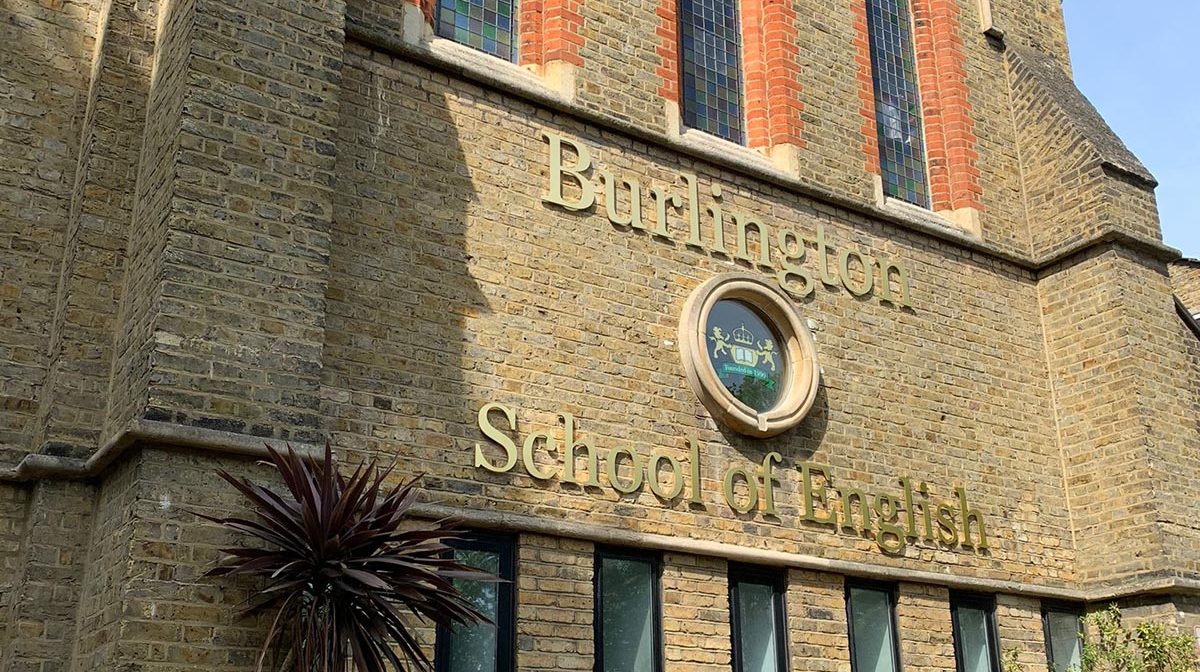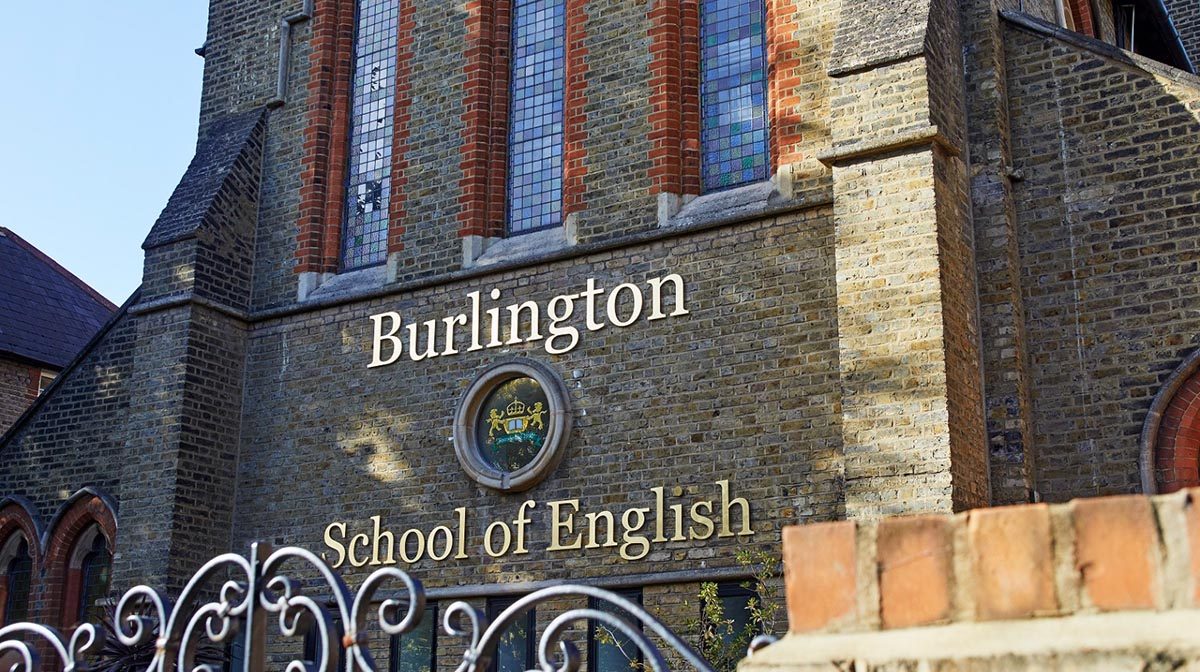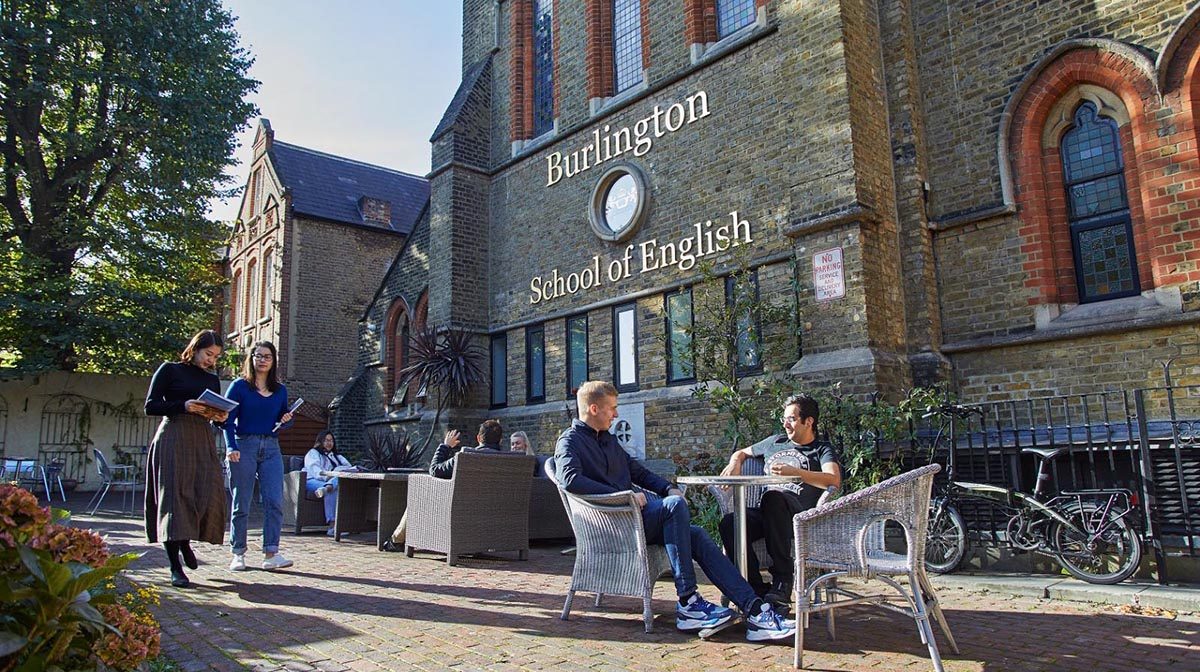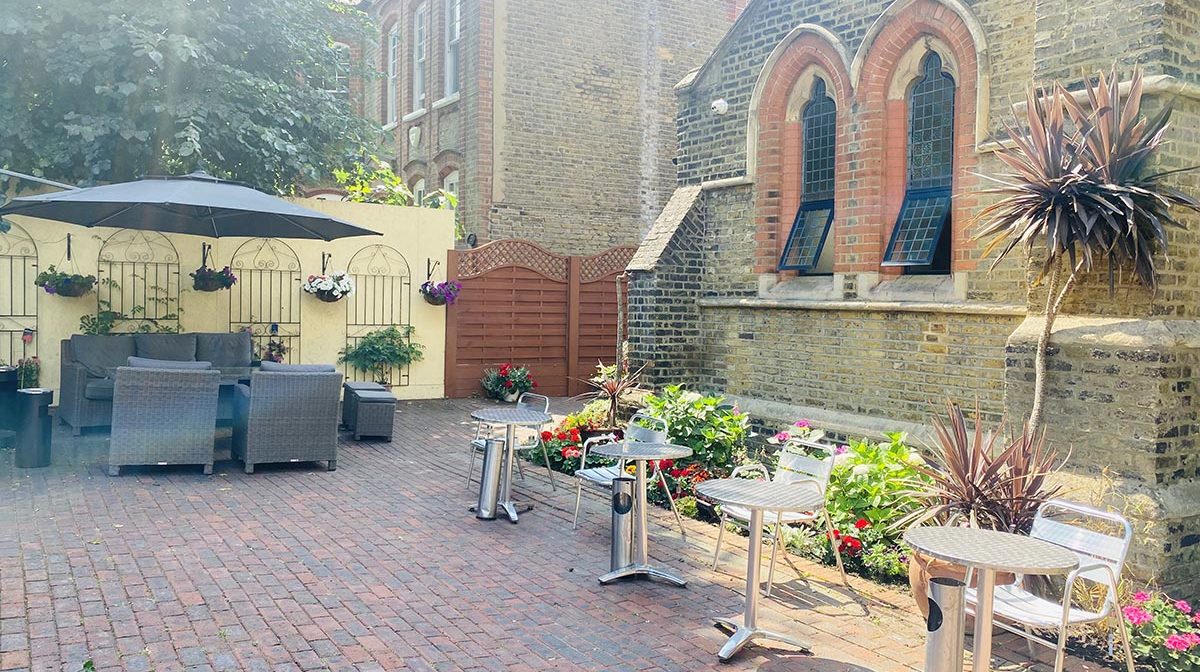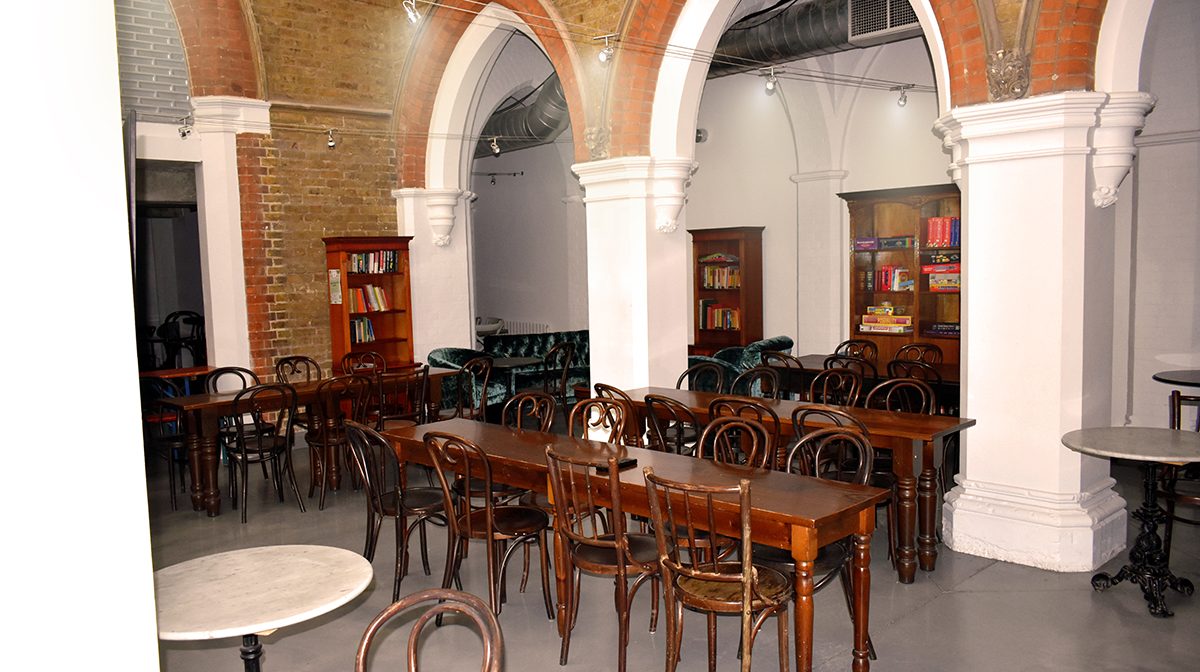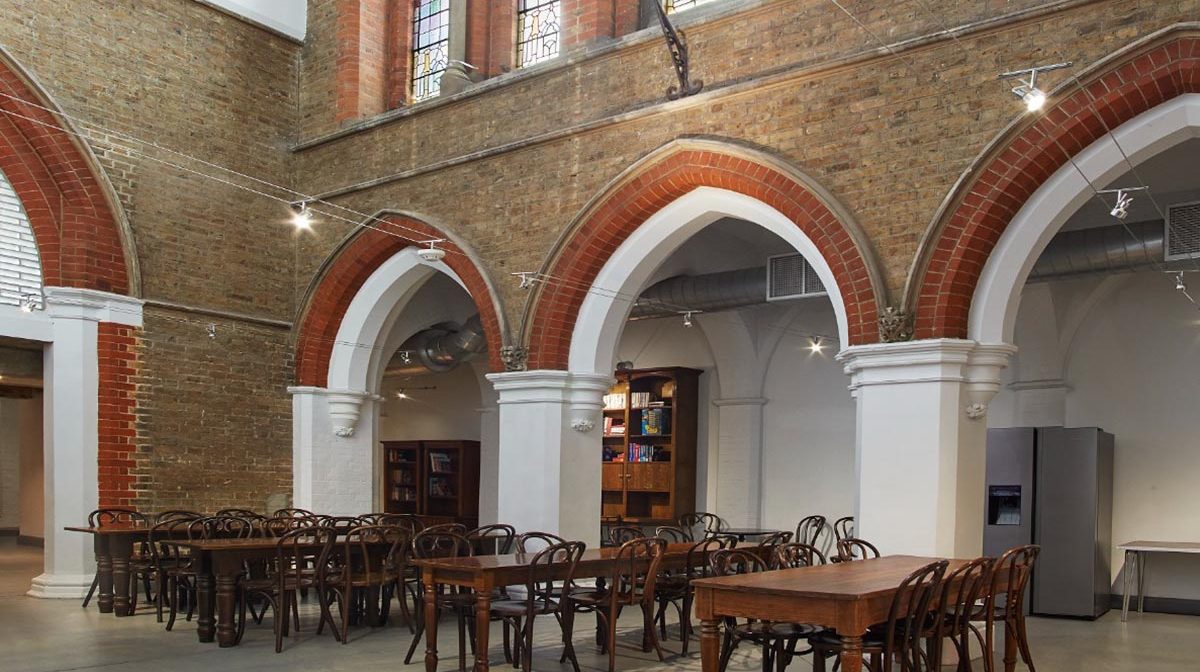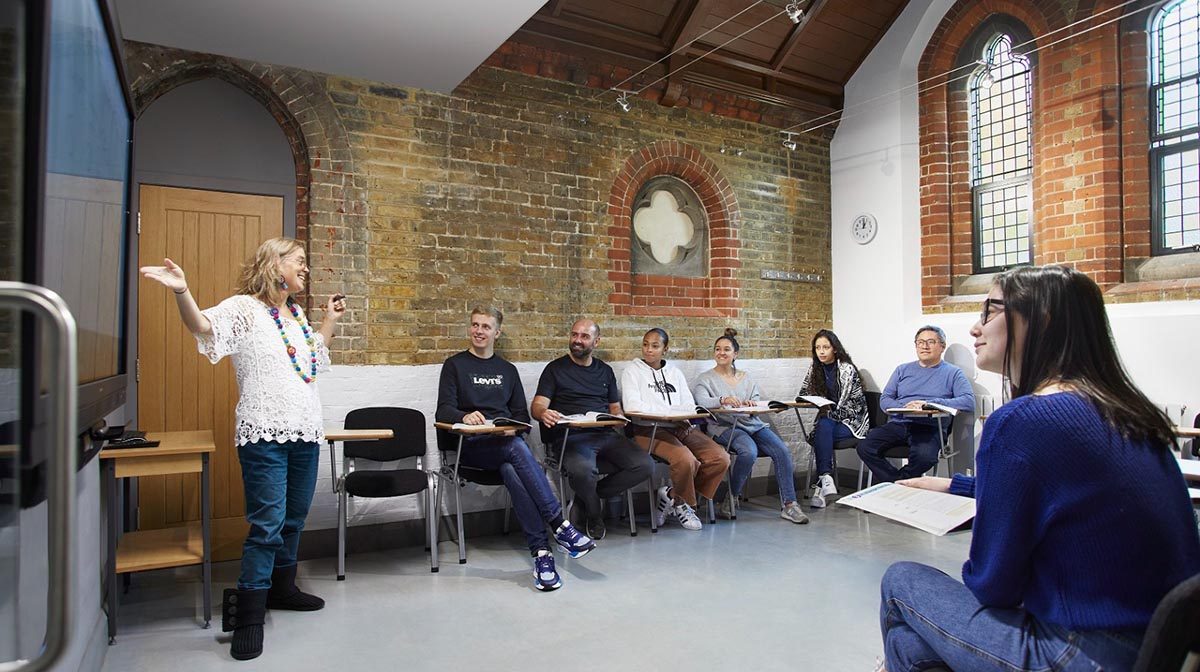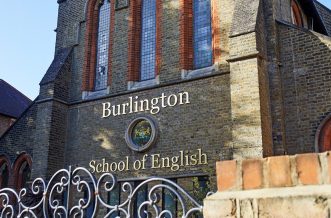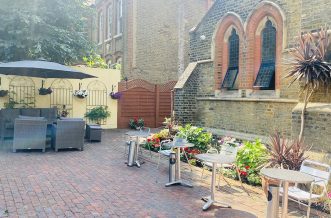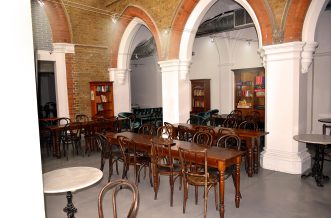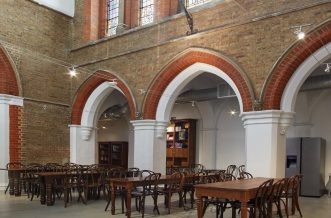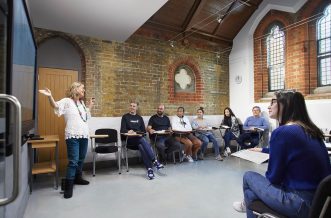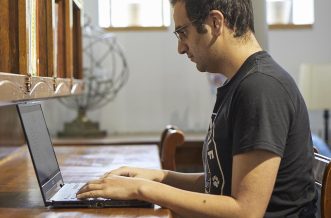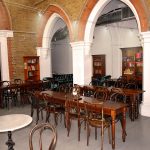Burlington School of English
- Die Burlington School of English in London wurde 1990 gegründet und zielt darauf ab, qualitativ hochwertige und innovative Englischkurse anzubieten. Burlingtons Curriculum beinhaltet einen kommunikativen und ganzheitlichen Ansatz mit kulturellem Eintauchen in die Sitten und Gebräuche des Vereinigten Königreichs. Sie sind hier, um den Bedürfnissen der Lernenden zu dienen, deren erste Sprache nicht Englisch ist und ihnen hilft, ihre englischen Sprachkenntnisse zu verbessern und erfolgreich zu sein, um ihre akademischen, geschäftlichen und persönlichen Ziele zu verfolgen.

Warum Burlington wählen?
Seit 1990 haben wir Studenten aus der ganzen Welt geholfen, selbstbewusstere Kommunikatoren im Englischen zu werden. Die Burlington School of English hat sich zu einer der führenden unabhängigen Sprachschulen in London entwickelt.
Wir sind stolz auf unseren Ruf für Exzellenz in unseren akademischen Programmen für Erwachsene und junge Lernende, unseren persönlichen Kundenservice und unsere familiäre Atmosphäre – und wir freuen uns, auf einen brandneuen Schulstandort expandiert zu sein.
Unser neues, millionenschweres Zentrum mit interaktiver Klassenzimmertechnologie und über 80 Wohnbetten vor Ort befindet sich in einem beliebten und gut angebundenen Stadtteil im Süden Londons, der eine hervorragende Verkehrsanbindung und Grünflächen in einer lokalen Gemeinschaft bietet, die unsere Studenten lieben.
Wir bieten das Komplettpaket: einen Gemeinschaftsraum zum Essen, Schlafen, Kontakte knüpfen und Studieren – alles unter einem Dach. Sie können Englisch durch authentische Interaktion mit der vielfältigen Bevölkerung Londons und einer Reihe lebhafter lokaler Unternehmen lernen.
2025: Allgemeines Englisch, IELTS-Vorbereitung, Cambridge-Prüfungsvorbereitung
| Anzahl der Wochen | Standardkurs Hauptsession +1 Workshop 15 Stunden pro Woche |
Intensivkurs Hauptsession +3 Workshops 22 Stunden 30 Minuten pro Woche |
|---|---|---|
| 1-4 Wochen | £295 pro Woche | £375 pro Woche |
| 5-11 Wochen | £275 pro Woche | £355 pro Woche |
| 12-23 Wochen | £255 pro Woche | £335 pro Woche |
| 24-35 Wochen | £235 pro Woche | £315 pro Woche |
| 36+ Wochen | £215 pro Woche | £295 pro Woche |
Spezialkurse £600
Enthalten:
- 20 Unterrichtsstunden Allgemeines Englisch/IELTS-Vorbereitung/Cambridge-Prüfungsvorbereitung pro Woche.
- 5 x einstündiger Minikurs.
- Flexibler und maßgeschneiderter Einzel- oder Kleingruppenunterricht nach Ihren spezifischen Bedürfnissen.
- Unser akademisches Team erstellt einen Kurs in Absprache mit Ihnen.
Allgemeines Englisch
Halbtags Standard:
Dieser Englischkurs konzentriert sich auf die vier Sprachfertigkeiten: Lesen, Schreiben, Sprechen und Hören. In diesem Kurs werden Sie viel Englisch üben, mit anderen interagieren und Spaß haben.
Ganztägig Intensiv:
Dieser Allgemein-Englisch-Kurs besteht aus zwei GE15-Sitzungen mit insgesamt sechs 45-minütigen Lektionen pro Tag. Er beginnt um 9 Uhr und endet um 16:30 Uhr mit einer Pause zwischen 11:30 Uhr und 14:00 Uhr.
Abendenglisch:
Dieser Kurs ist für diejenigen gedacht, die ihre Englischkenntnisse verbessern möchten, während sie den ganzen Tag über Aktivitäten wie Studium oder Arbeit nachgehen. Der Lehrplan konzentriert sich auf die Verbesserung der vier Sprachfertigkeiten: Sprechen, Lesen, Schreiben und Hören.
Englisch für Lehrer
Der Kurs kombiniert 15 Lektionen Allgemeines Englisch, um Ihre Sprachfähigkeiten je nach Ihrem Niveau zu verbessern, sowie fünf Lektionen Einzelunterricht, der sich auf die Verbesserung Ihrer Fähigkeiten im Unterrichten von Englisch als Fremdsprache konzentriert.
Die Studierenden verbessern ihre eigenen Sprachfähigkeiten und lernen verschiedene Ansätze und Theorien im Bereich Englisch als Fremdsprache (EFL) sowie praktische Vorschläge für den Unterricht. Der Kurs umfasst eine detaillierte Bedarfsanalyse jedes Studierenden und behandelt Themen wie Englischphonologie, Grammatik, Verbesserung der Klassenzimmerdynamik, Einsatz von Technologie im Klassenzimmer und Nutzung authentischer Materialien.
Medizinisches Englisch
Der Kurs kombiniert 15 Lektionen Allgemeines Englisch zur Verbesserung Ihrer Sprachkenntnisse je nach Niveau und fünf Lektionen Einzelunterricht, der sich auf die Verbesserung Ihres Fachvokabulars in der englischsprachigen medizinischen Gemeinschaft konzentriert.
Der Lehrplan wird mit dem Studierenden abgestimmt, um den Kurs individuell auf die Bedürfnisse des Studierenden anzupassen. Der Kurs konzentriert sich auf die Entwicklung von Präsentationsfähigkeiten sowie auf das Lesen medizinischer Texte und das Schreiben von Berichten. Dieser Kurs ist eine beliebte Wahl für Studierende, die Englischunterricht zur Unterstützung ihrer beruflichen Ziele suchen.
Englisch für akademische Zwecke
Dieser Kurs wird normalerweise von denen besucht, die ihr Studium an einer britischen Universität fortsetzen möchten. Das Programm kombiniert Allgemeines Englisch mit Modulen, die sich auf akademisches Englisch konzentrieren.
Sie werden 15 Lektionen pro Woche Allgemeines Englisch und fünf Lektionen spezialisierte Universitätsvorbereitung studieren und müssen erhebliche zusätzliche Zeit für Forschungs- und Hausaufgabenaufgaben aufwenden.
Die Einzelunterrichtsstunden sind besonders intensiv und eine beliebte Wahl für diejenigen, die bereit sind, hart zu arbeiten, um ihre akademischen Ziele zu unterstützen.
Der Kurs wird es Ihnen ermöglichen, mehr über die ersten akademischen Programme an britischen Universitäten zu erfahren und Ihre akademischen sowie selbstständigen Lerntechniken zu entwickeln. Sie werden auch Ihre Sprachfähigkeiten auf ein Niveau verbessern, das es Ihnen ermöglicht, effektiv an grundständigen Studien in Großbritannien teilzunehmen.
Der Kurs umfasst:
- Englischsprachentraining,
- Interkulturelles Studium,
- Lernertraining,
- besteht aus drei 12-wöchigen Modulen, die in der Komplexität zunehmen.
- Sie werden auch Zeit für die Vorbereitung auf die IELTS-Prüfung für den Eintritt an eine britische Universität aufwenden.
Kulturstudien
Der Kurs kombiniert 15 Lektionen General English, um Ihre Sprachkenntnisse je nach Niveau zu verbessern, und fünf Lektionen Einzelunterricht, die sich auf die Vertiefung Ihres Verständnisses der britischen Geschichte und Kultur beim Erlernen der Sprache konzentrieren. Sie werden Ihre Sprachfähigkeiten durch das Studium von Themen, an denen Sie besonderes Interesse haben, entwickeln und gleichzeitig ein Verständnis für den sozialen, kulturellen und historischen Kontext der englischen Sprache erlangen.
Dieser Englischkurs besteht aus drei Modulen:
Leben und Literatur:
Eine Studie über wichtige britische Autoren, Dramatiker und Dichter, von Shakespeare bis zur Moderne.
Wichtige Themen:
Sie werden ein tieferes Verständnis für soziale und politische Themen entwickeln, die das moderne Großbritannien prägen, einschließlich der Monarchie, der Beziehungen zu Europa und Nordirland.
Großbritannien heute:
Sie werden Werke moderner britischer Schriftsteller wie Dylan Thomas und Philip Larkin sowie Filme und Liedermacher von den Siebzigern bis zur Gegenwart studieren. Dies ist eine spannende Gelegenheit, die Inhalte und Themen dieser Werke zu untersuchen und zu diskutieren, was sie über das britische Volk verraten.
Allgemeines Business Englisch
Wenn Sie in einem Unternehmen arbeiten möchten, in dem Englisch die Hauptsprache ist, dann ist dieser Kurs genau das Richtige für Sie! Der Unterricht konzentriert sich darauf, allgemeines Business-Englisch-Vokabular und Sprachkenntnisse in einer Büroumgebung zu erwerben.
Der Kurs kombiniert 15 Lektionen General English, um Ihre Sprachkenntnisse je nach Niveau zu verbessern, und fünf Lektionen in kleineren Gruppen oder im Einzelunterricht.
Diese Lektionen konzentrieren sich darauf, Ihre Business-Englisch-Fähigkeiten zu erweitern, indem Sie mit Ihrem engagierten Lehrer üben, wie Sie verschiedene Situationen bewältigen, in denen Business-Englisch verwendet wird, wie zum Beispiel bei Vorstellungsgesprächen, Besprechungen, Präsentationen und Telefonaten.
Tourismus-Industrie Englisch
Dies ist einer der am schnellsten wachsenden Dienstleistungssektoren weltweit. Wenn Sie in der Tourismus- und Reisebranche arbeiten möchten, dann ist dieser Kurs für Sie!
Der Kurs kombiniert 15 Lektionen General English, um Ihre Sprachkenntnisse je nach Niveau zu verbessern, und fünf Lektionen in kleineren Gruppen oder im Einzelunterricht. Diese kleineren Gruppenlektionen am Nachmittag ermöglichen es Ihnen, sich auf die für den Bereich relevante Sprache zu konzentrieren und sich mit einigen relevanten Aspekten der Reisebranche vertraut zu machen.
Sie und Ihr Lehrer werden sich darauf konzentrieren, Vokabular zu erwerben, das für Ihr Fachgebiet relevant ist, indem Sie Fallstudien verwenden und sich mit Ihnen zu spezifischen Themen austauschen – so haben Sie die Möglichkeit, die Sprache in diesem Bereich zu üben.
Die Wahl Londons als Standort für das Erlernen von Tourismus-Industrie-Englisch ist strategisch sinnvoll, wenn Sie nach Jobmöglichkeiten in einer Stadt suchen, die oft das beliebteste Touristenziel der Welt ist.
Marketing Englisch
Dieser Kurs richtet sich an Studierende, die eine Karriere im Marketing anstreben, einem Bereich des Geschäftslebens, der Personen benötigt, die effektiv und überzeugend sind.
Der Kurs kombiniert 15 Lektionen General English, um Ihre Sprachkenntnisse je nach Niveau zu verbessern, und fünf Lektionen in kleineren Gruppen oder im Einzelunterricht mit einem erfahrenen Lehrer, der sich auf Ihre Verbesserung und Erfolge während des Kurses konzentriert. Diese kleineren Gruppenlektionen am Nachmittag ermöglichen es Ihnen, sich auf die für den Bereich relevante Sprache zu konzentrieren.
Allgemeines Büro Englisch
In diesem Kurs erwerben Sie Englischkenntnisse, die in einer typischen englischsprachigen Büroumgebung verwendet werden.
Der Kurs kombiniert 15 Lektionen General English, um Ihre Sprachkenntnisse je nach Niveau zu verbessern, und fünf Lektionen in kleineren Gruppen oder im Einzelunterricht. Während dieser kleineren Gruppenlektionen liegt ein besonderer Fokus auf alltäglichen Interaktionen in multinationalen Büros, in denen Englisch die Hauptsprache der Kommunikation ist.
Der Lehrer simuliert Büroumgebungen und die effektivsten Methoden für Kommunikation in schriftlicher und mündlicher Form in verschiedenen Situationen.
Import/Export Englisch
Dieser Kurs behandelt typische Kommunikationsherausforderungen, mit denen Handelsunternehmen konfrontiert sind, die mit westlichen Unternehmen, Lieferanten und Handelspartnern auf Englisch kommunizieren.
Der Kurs kombiniert 15 Lektionen General English, um Ihre Sprachkenntnisse je nach Niveau zu verbessern, und fünf Lektionen in kleineren Gruppen oder im Einzelunterricht. Während dieser kleineren Gruppenlektionen liegt der Schwerpunkt auf alltäglichen Interaktionen.
Sie werden viele Vokabeln und Ausdrücke lernen, die mit Ihrem Fachgebiet zu tun haben, und Ihr Englisch üben, um Ihre Sprachkompetenz in diesem speziellen Bereich zu erweitern.
IELTS
Das International English Language Testing System (IELTS) ist ein international standardisierter Test zur Messung der Englischkenntnisse, der von den meisten Institutionen in englischsprachigen Ländern und vielen Arbeitgebern anerkannt wird. Auch diejenigen, die nach Kanada oder Neuseeland auswandern möchten, benötigen eine IELTS-Qualifikation.
Die Teilnahme an diesem Test eröffnet neue Perspektiven, sei es, um Ihr Studium in einem englischsprachigen Land fortzusetzen oder in diesen Ländern zu arbeiten und zu leben. IELTS bietet Ihnen auch die Anerkennung Ihrer Englischkenntnisse, falls Sie diese in Ihrem Heimatland benötigen.
Am Ende des Tests wird allen Kandidaten ein Testberichtformular mit einer Punktzahl von „Band 1“ („kein Benutzer“) bis „Band 9“ („Expertenbenutzer“) ausgestellt, wobei jede Institution einen anderen Schwellenwert festlegt. Es gibt auch eine Punktzahl von „Band 0“ für diejenigen, die den Test nicht abgelegt haben.
Vorbereitungskurs:
IELTS Vorbereitung:
Die Burlington School bietet zwei Arten von IELTS-Vorbereitungskursen an, abhängig von Ihrem Niveau:
IELTS Intermediate:
Dieser Kurs ist eine Einführung in die IELTS-Prüfung. Sie erhalten viel Prüfungspraxis und haben die Möglichkeit, Ihre Fähigkeiten im Hörverständnis, Sprechen, Lesen und Schreiben zu verbessern. Um an diesem Kurs teilzunehmen, sollten Sie das Niveau Upper-Intermediate oder höher (B2-Niveau des Gemeinsamen Europäischen Referenzrahmens für Sprachen, CEFR) erreicht haben.
IELTS Advanced.
Dieser Kurs ist eine Erweiterung des IELTS Intermediate-Kurses und richtet sich an diejenigen, die Englisch auf einem fortgeschrittenen Niveau oder höher beherrschen (C1-Niveau des CEFR). Er bietet einen detaillierteren Einblick in die für die Prüfung notwendigen Fähigkeiten als der Einführungskurs.
Cambridge English: Advanced (CAE)
Die Nachfrage nach hochqualifizierten Englischkenntnissen wächst weltweit. Das Bestehen der Cambridge English: Advanced-Prüfung (CAE) zeigt, dass Sie ein Hochleister sind.
Diese Prüfung ist auf dem Niveau C1 des Gemeinsamen Europäischen Referenzrahmens für Sprachen (CEFR) angesiedelt. Die Prüfung besteht aus 5 gleichwertig gewichteten Prüfungen:
- Prüfung 1 – Lesen
- Prüfung 2 – Schreiben
- Prüfung 3 – Gebrauch von Englisch (Grammatik und Wortschatz)
- Prüfung 4 – Hörverständnis
- Prüfung 5 – Sprechen
Vorteile des Studierens für den CAE:
- Wird weltweit als Nachweis für hohe Leistungen anerkannt
- Mehr als 3.000 Bildungseinrichtungen, Unternehmen und staatliche Stellen weltweit akzeptieren das Cambridge English: Advanced (CAE) als Nachweis für hochqualifizierte Leistungen.
- Ist ein Zertifikat mit vielen Möglichkeiten
- Hilft Ihnen, die sprachlichen Fähigkeiten zu entwickeln, die Sie für den Erfolg benötigen, und kann für Ihre Universitäts- und Visumanträge in Großbritannien und Australien verwendet werden.
- Bietet hochqualifizierte Englischkenntnisse für akademischen und beruflichen Erfolg
Die Vorbereitung auf das Cambridge English: Advanced (CAE) hilft Lernenden, die Fähigkeiten zu entwickeln, die sie benötigen, um das Beste aus ihrem Studium, ihrer Arbeit und ihrem Leben in englischsprachigen Ländern zu machen.
Cambridge English: First (FCE)
Die Cambridge English: First (FCE) Prüfung ist eine Qualifikation auf dem oberen mittleren Niveau. Sie beweist, dass Sie alltägliches geschriebenes und gesprochenes Englisch für Arbeits- oder Studienzwecke verwenden können.
Jedes Jahr nehmen Tausende von Menschen, die ihr Englisch verbessern möchten, die FCE-Prüfung und können sie dazu nutzen, um auf Stiftungs- oder Vorbereitungsniveau in englischer Sprache zu studieren. Die Prüfung verwendet realistische Situationen, die speziell darauf ausgerichtet sind, Ihnen zu helfen, effektiver zu kommunizieren und die sprachlichen Fähigkeiten zu erlernen, die Sie benötigen, um den nächsten Schritt zum Erfolg zu machen.
Diese Prüfung wird von vielen führenden Unternehmen und Bildungseinrichtungen weltweit als Qualifikation auf dem oberen mittleren Englisch-Niveau anerkannt. Die FCE-Prüfung ist auf dem Niveau B2 des Gemeinsamen Europäischen Referenzrahmens für Sprachen (CEFR) angesiedelt. Dieses Niveau bedeutet, dass Sie die Hauptideen komplexer Texte verstehen, Gespräche zu einer Vielzahl von Themen führen, Meinungen äußern und Argumente präsentieren sowie klare, detaillierte Texte schreiben können, in denen Sie Meinungen äußern und die Vor- und Nachteile verschiedener Standpunkte erklären.
Cambridge English: Proficiency (CPE)
Die Cambridge English: Proficiency (CPE) ist die fortgeschrittenste Englischprüfung, die von der Universität Cambridge angeboten wird. Sie beweist, dass das Niveau derjenigen, die das CPE bestanden haben, dem von gebildeten englischen Muttersprachlern entspricht, bewertet auf C2 des Gemeinsamen Europäischen Referenzrahmens für Sprachen (CEFR).
Die Prüfung richtet sich an Personen, die im Ausland in einem englischsprachigen Land oder in einem Umfeld studieren, arbeiten und leben möchten, das hohe Englischkenntnisse erfordert.
Die Prüfung besteht aus vier Teilen:
- Lesen & Gebrauch des Englischen (1 Stunde und 30 Minuten),
- Schreiben (1 Stunde und 30 Minuten);
- Hören (ca. 40 Minuten);
- Sprechen (ca. 16 Minuten).
Vorteile der Cambridge English Proficiency-Prüfung:
- Erwerben Sie außergewöhnliche Englischkenntnisse während der Prüfungsvorbereitung;
- Beweisen Sie Ihre Englischkenntnisse;
- Der Test wird von vielen internationalen Organisationen anerkannt, insbesondere von Unternehmen.
TOEFL & TOEIC
Beide Tests, TOEFL und TOEIC, messen Ihre Englischkenntnisse. Der Unterschied zwischen beiden liegt nicht im Schwierigkeitsgrad, sondern im Zweck. Während der TOEFL akademische Themen abdeckt, umfasst der TOEIC geschäftsbezogene Themen.
Über den TOEFL
Der Test of English as a Foreign Language (TOEFL) misst Ihre Fähigkeit, die englische Sprache in Universitäts- und College-Umfeldern zu verwenden. Diese Prüfung ist für diejenigen konzipiert, die ihre Englischkenntnisse gegenüber Institutionen nachweisen möchten, insbesondere für Studierende, die auf Universitätsebene in englischsprachigen Ländern studieren möchten.
Viele Regierungsbehörden, Lizenzierungsstellen und Universitäten außerhalb des Vereinigten Königreichs verlangen eine bestimmte TOEFL-Punktzahl. Mehr als 8.500 Colleges, Behörden und andere Institutionen in 130 Ländern akzeptieren TOEFL-Ergebnisse.
Die Prüfung dauert insgesamt vier Stunden und deckt die vier grundlegenden Sprachfertigkeiten ab – Lesen, Schreiben, Hören und Sprechen, wobei einige Aufgaben das Integrieren mehrerer Fertigkeiten erfordern. Alle Aufgaben konzentrieren sich auf die englische Sprache im akademischen Umfeld.
Über den TOEIC
Der Test of English for International Communication (TOEIC) ist eine Englischprüfung, die speziell entwickelt wurde, um die alltäglichen Englischkenntnisse von Menschen in internationalen Umfeldern zu messen.
Diese Prüfung wird weltweit von Arbeitgebern genutzt, um festzustellen, wer unter den nicht-muttersprachlichen Englischsprechern effektiv auf Englisch kommunizieren kann. Mehr als 10.000 Organisationen in 120 Ländern nutzen diese Prüfung, um zu entscheiden, welcher Kandidat über die geeigneten Englischkenntnisse verfügt, um im globalen Arbeitsumfeld erfolgreich zu sein.
Es gibt zwei Arten von TOEIC-Tests: einen Lese- und Hörverständnistest und einen Sprech- und Schreibtest. Jede Prüfung dauert zwei Stunden und bewertet die vier Sprachfertigkeiten in einem internationalen Geschäftsumfeld.
Was andere sagen...
„Wir arbeiten seit über 5 Jahren mit London Homestays zusammen. Mit ihrer Unterstützung haben wir eine hohe Kundenzufriedenheit erreicht. Wir empfehlen London Homestays jedem, der Qualität, Zuverlässigkeit und einen außergewöhnlichen Kundenservice sucht.“
Alex Fernandes, Unterkunft & Visa Bewilligungs Manager, Malvern House London„Ich arbeite seit 2013 mit London Homestays zusammen und kann sagen, dass sie immer darauf geachtet haben, unsere Schüler in geeigneten Gastfamilien unterzubrinen. Sie haben eine sehr freundliche und dennoch professionelle Herangehensweise an ihre Arbeit. Unsere Studenten haben es genossen, bei ihren Gastfamilien zu bleiben. Insgesamt sagen die Schüler, dass ihre Gastfamilien aufmerksam und einladend sind.“
Carl Roberton, Schulleiter, Stafford House School of English„Wir bei Burlington School arbeiten seit 2014 mit London Homestays zusammen und ich kenne das Team seit 2009, durch meine Arbeit bei einem anderen Unternehmen in der Bildungs- und Unterkunftsindustrie. Nachdem ich die Gelegenheit hatte, mit London Homestays zu arbeiten, seit die Firma in London ihren Betrieb aufnahm, wurden alle Anfragen in einer engagierten und zeitnahen Weise behandelt, die Teammitglieder sind kundenorientiert und bieten unseren Studenten immer ein außergewöhnliches Unterkunftserlebnis. Ich zögere keine Sekunde, London Homestays als exzellente Unterkunftsanbieter und Geschäftspartner zu empfehlen.“
Eliane Tomasi, Unterkunft & Wohlfahrtsbeauftragter, Burlington School„LSC Stanton arbeitet seit 2011 mit London Homestays zusammen und wir freuen uns sehr über die Qualität der Unterkunft des Services. Wir haben eine gute Beziehung zum Team und sie helfen uns immer, bei Last-Minute-Anfragen.“
Nick Bray, Geschäftsführer, London Study Centre.„Die Zusammenarbeit mit London Homestays ist immer großartig! Wir schätzen einen proaktiven Ansatz und Aufwand, um die bestmöglichen Dienstleistungen für unsere Gruppen zu gewährleisten. Wir hatten immer eine tolle und saubere Unterkunft, freundliche Familie und schicke lokale Veranstalter. Studenten unserer Gruppen waren zufrieden und sie genossen es, in London zu leben. Wir möchten diese Agentur empfehlen. Das ganze Team ist sehr nett.“
Miroslava Foltýnová, Inhaber, CK Bus Tours.„Wir bieten Praktika in London an europäische Studenten und suchten einen zuverlässigen Partner für die Bereitstellung von Unterkünften für unsere Kandidaten. Wir waren sehr zufrieden mit den Dienstleistungen von London Homestays. Unsere Kandidaten haben immer schnell Informationen über Familien erhalten. Die Möglichkeit, kurzfristig ein Zimmer zu buchen und das in einer guten Qualität. Ich würde diese Agentur ohne Zweifel weiterempfehlen. Das Team ist sehr professionell, effizient und freundlich 🙂 Wir hoffen, dass wir neue Auszubildende bald senden können!“
Stéphanie Frassanito, Programmleiterin, Arbeit Übersee„Unsere Schule aus der Tschechischen Republik hat tolle Erfahrungen mit London Homestays gemacht. Sie sind eine der einzigen Gastgeberagenturen, die unseren sehr jungen Gästen (unter 12) eine Unterkunft vermitteln . Die Gastfamilien waren in der Regel einladend, freundlich und zuvorkommend. Durch die Koordinatorin Kate O’Connor und andere Mitarbeiter ist der Servie unübertreffbar.“
Kate Powers, Vizepräsidentin von Englisch Studien, Sunny Canadian International SchoolEs war eine tolle Erfahrung. Ich habe ein neues Zuhause gefunden, indem ich mich gleich wohl fühle wie ich in meinem eigenen Zuhause!
Laura, Studentin aus Frankreich: Gastfamilienbuchung Zone 2„Als meine Kinder zum Studieren an die Universität gingen und heirateten, waren mein Mann und ich leere Nestler, die in einem großen Haus umherirrten. Wir haben ein leeres Schlafzimmer und ich genieße es sehr, es für neue Studenten, die kurz- oder langfristig bei uns wohnen, frisch zu halten. Sie zeigen uns ausnahmslos viel Respekt. Nach London zu kommen, um zu studieren oder als Praktikanten zu arbeiten, ist ein großes Abenteuer für sie, und ich genieße es, sie einzugewöhnen und zu sehen, wie sie sich entwickeln. Einige kehren zurück oder empfehlen uns ihren Freunden, bei uns zu wohnen. London Homestays ist eine großartige Organisation, mit der man zusammenarbeiten kann – sie kommunizieren gut und sind sehr ethisch.“
Cathy, Gastfamilien-Gastgeberin in Colindale, LondonMeine Gastfamilienmutter Debra hat meinen Aufenthalt in die unglaublichste Erfahrung meines ganzen Lebens verwandelt!
Florian, Student aus Belgien: Gastfamilienbuchung in Zone 3.„Ich fühlte mich sehr wohl mit meiner Gastfamilie! Sie war sehr nett … vielen Dank!“
Doris, Studentin aus Italien: Superior Gastfamilie in Zone 2„Shanghai Chelsea International Consulting (SCIC) hat mit Home from Home viele Male gearbeitet und sie haben uns einen sehr professionellen Service zur Verfügung gestellt.“
Chan Sen, Direktor bei Shanghai Chelsea International Consulting
